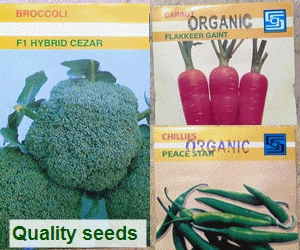Total space of 27.77 lakh hectares is covered under natural farming in the nation, says the govt agency. Government inspired this farming during the dedicated schemes. Some of the schemes are Paramparagat Krishi Vikas Yojana and Mission Organic Value Chain Development of North East Region.
Both the schemes aim at promotion of cluster and Farmers Producer Organization (FPO) based chemical free, low enter price, sustainable organic farming and toughen farmers from enter procurement to marketplace linkages.
Management Agricultural National Institute of Extension (MANAGE), Hyderabad conducted affect study and located that there was once 10-20% relief in cost of cultivation and 20-50% build up in net returns to natural farmers.
Zero finances herbal farming (ZBNF) is a method of chemical-free agriculture drawing from conventional Indian practices.
It was firstly promoted via Maharashtrian agriculturist and Padma Shri recipient Subhash Palekar, who evolved it within the mid-1990s as an alternative to the Green Revolution’s strategies driven through chemical fertilizers and insecticides and intensive irrigation. He argued that the rising value of these external inputs was a leading cause of indebtedness and suicide among farmers, while the affect of chemical substances at the environment and on long-term fertility used to be devastating. Without the wish to spend money on these inputs — or take loans to buy them — the cost of production may well be diminished and farming made right into a “zero budget” workout, breaking the debt cycle for lots of small farmers.
Zero finances herbal farming (ZBNF) is a method of chemical-free agriculture drawing from conventional Indian practices.
According to National Sample Survey Office (NSSO) knowledge, almost 70% of agricultural households spend greater than they earn and more than half of all farmers are in debt. In States comparable to Andhra Pradesh and Telangana, ranges of indebtedness are round 90%, where every household bears a mean debt of ₹1 lakh. In order to achieve the Central government’s promise to double farmers source of revenue by way of 2022, one aspect being considered is herbal farming strategies such because the ZBNF which cut back farmers’ dependence on loans to purchase inputs they can not come up with the money for. Meanwhile, inter-cropping allows for higher returns.
The Indian Council of Agricultural Research is finding out the ZBNF methods practised by way of basmati and wheat farmers in Modipuram (Uttar Pradesh), Ludhiana (Punjab), Pantnagar (Uttarakhand) and Kurukshetra (Haryana), evaluating the impact on productiveness, economics and soil health including soil natural carbon and soil fertility.
If discovered to be successful, an enabling institutional mechanism may well be set as much as promote the era, NITI Aayog vice-chairman Rajiv Kumar has said. The Andhra Pradesh experience is also being monitored carefully to pass judgement on the need for further public funding toughen.










[…] Source link […]